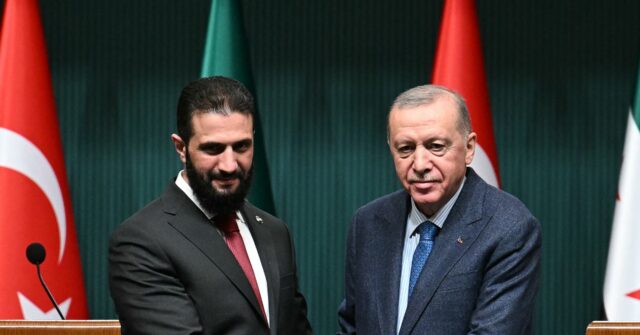Syrian President Ahmed al-Sharaa, the leader of the Hayat Tahrir al-Sham (HTS) terrorist organization, said during a meeting this week with Islamist Turkish President Recep Tayyip Erdogan he seeks cooperation with Turkey on “all political, economic and security levels” to rebuild his war-torn country.
Sharaa, formerly known by the jihadist nom de guerre “Abu Mohammed al-Jolani,” led HTS to victory in the over decade-long Syrian Civil War in late 2024, storming through Syria’s major cities and prompting the collapse of the Syrian military. Longtime dictator Bashar Assad fled the country to Russia in the hours between December 7 and 8, leaving Damascus to HTS, an al-Qaeda offshoot jihadist organization.
Sharaa has spent much of his time since becoming de facto leader of the country attempting to address global alarm at the ascent of a jihadist terrorist organization to power in a country with a complex fabric of ethnicities and religions. Christians in the country have held protests against HTS and demanded the group not impose an Islamist regime, which Sharaa has indicated is his goal. Sharaa has nonetheless claimed that his government will be “inclusive” and Islamic at the same time, doing little to calm those concerns.
The ruling HTS coalition in Syria promoted Sharaa from de facto leader of official president in late January. Immediately after the announcement of a complete reshuffling of Syrian politics that included, in addition to Sharaa’s presidency, the dissolution of the Syrian constitution and other measures, Sharaa began a global tour of regional allies seeking support for the reconstruction of his country. Sharaa began with a visit to Saudi Arabia, where he discussed investment, security, and other issues with Crown Prince Mohammed bin Salman.
In Turkey, Sharaa held a private meeting with Erdogan to both thank him for his opposition to the Assad regime and seek support for the rebuilding of the country.
Erdogan’s Turkey has held a longstanding policy of support to Syrian rebel groups and the Turkish military itself has repeatedly invaded the country, usually targeting U.S.-allied Syrian militias that HTS does not have a hostile relationship with. Erdogan himself said in 2016, however, that the Turkish military was not in Syria to destroy Kurdish communities, but to “end the rule of the tyrant Assad … and not for any other reason.”
Sharaa thanked Erdogan “for his hospitality and warm welcome” and for his “honorable stance” against Assad while in Ankara, the state-run Syrian Arab News Agency (SANA) reported on Wednesday.
“We look forward to enhancing coordination between the two countries at all political, economic and security levels in a way that serves common interests and bolsters cooperation in facing challenges in the coming stage,” Sharaa added.
Turkey’s state news outlet, the Anadolu Agency, quoted Assad on Tuesday as promising “lasting friendship and cooperation” to the Syrian people.
“Being of historic importance, I see this visit today as the start of a new era of eternal friendship and cooperation. All of our institutions have been working tirelessly to rebuild our relationship to a strategic level,” Erdogan proclaimed. “We have no doubt that our Syrian sisters and brothers, who inspire the region with their resilience, will rebuild their country.”
Erdogan said that Turkey was specifically interested in offering humanitarian aid and “the rebuilding of critical infrastructure.” In the 13 years that the civil war lasted, Assad, the Islamic State, and other relevant actors leveled entire neighborhoods of some of Syria’s largest cities, including Raqqa, Homs, Aleppo, and Idlib. The destruction caused one of the world’s largest migrant crises, forcing 6 million people to flee. Sharaa and HTS have prioritized welcoming those refugees home, but many will have no homes to return to without a massive reconstruction effort.
“Besides humanitarian aid to Syria’s devastated landscape, we are also ready to support the rebuilding of critical infrastructure,” Erdogan promised. “As Syria’s economic recovery gains momentum, so will the voluntary returns gain traction.”
Turkish President Recep Tayyip Erdogan (R) welcomes Syria’s interim President Ahmed al-Sharaa (L) with an official ceremony at the Presidential Complex in Ankara, Turkiye on February 04, 2025. (Turkish Presidency / Mustafa Kamaci / Handout/Anadolu via Getty Images)
Turkey has a vested interest in the return of Syrian refugees as it is home to the world’s largest Syrian refugee population. At the time of the end of the war, Turkey had docucmented the entry of 3 million Syrian refugees into the country. Desperate to get them out of Turkey, some local governs began offering free flights home following the demise of the Assad regime.
In addition to direct Turkish aid, Erdogan said he would support efforts to lift international sanctions on the country. Syria is subject to one of the world’s strictest sanctions regimes due to Bashar Assad’s long record of human rights atrocities. Paramount on that sanction list is its place on the U.S. State Department’s State Sponsors of Terrorism list for its support of Hezbollah and other Iran-backed terror groups. HTS supporters argue that, with the fall of the Assad regime, these sanctions should end, but HTS itself is a U.S.-designated Foreign Terrorist Organization, raising its own challenges.
While not officially a state sponsor of terrorism, the Turkish government is one of the world’s most supportive towards the jihadist terror organization Hamas, responsible for an unprecedented massacre of civilians on October 7, 2023. Erdogan himself has repeatedly declared that he does not consider Hamas a terrorist organization and organized public events to support the jihadists.
The visit concluded with Sharaa inviting Erdogan to visit Syria “at the earliest opportunity.”
Follow Frances Martel on Facebook and Twitter.
Read the full article here


